SEIU Admits Election Fraud
The Los Angeles Times is reporting that One of Los Angeles’ largest public employee unions admitted Tuesday…
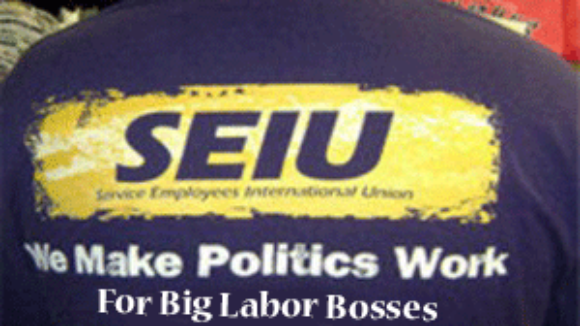
The Los Angeles Times is reporting that One of Los Angeles’ largest public employee unions admitted Tuesday…
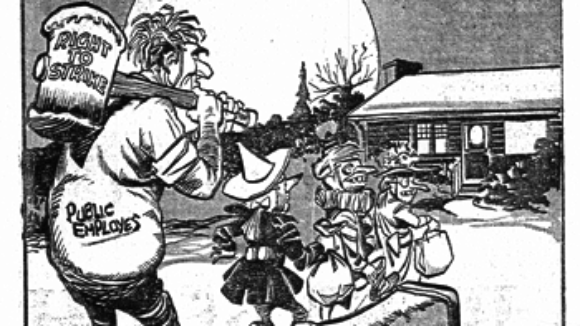
Reason opines that the fiscal reality of many cities have ended the love affair, in some instances, between local Democrat mayors and the union who elected them. But, it will likely not bring reform aslong as political machines a mostly funded and controlled by labor union bosses: When Chicago public school teachers started the fall semester by turning down a $400 million contract offer that would have boosted pay by 16 percent over four years, my first concern wasn’t for the children. It was for the Democrats. Sure, the walkout by Chicago Teachers Union members caused havoc for kids. But I’ve been to public school, and I can tell you they didn’t miss much. The strike’s lasting damage was to the party that since at least the early 20th century has been labor’s best friend. Chicago Mayor Rahm Emanuel is not just some schmuck in the donkey party: He is President Barack Obama’s former chief of staff, the congressional leader behind the Democrats’ 2006 House takeover, a Clinton administration arm twister so feared that he is still known by his ’90s nickname, Rahmbo. But the strike made Chicago’s tough-guy mayor look like Chuck “Bayonne Bleeder” Wepner. Striking teachers dubbed him “Empermanuel,” accused him of having “no respect for us as people,” and even claimed (falsely, it turned out) that Emanuel was a fan of the Canadian alt-rock quartet Nickelback. When the teachers returned to work after more than a week on the picket line, they had scored a big pay increase and crippled the teacher-evaluation testing at the heart of the strike, a resolution Emanuel unconvincingly called an “honest compromise.” Emanuel is one of many recent Democratic chief executives who have, with varying levels of enthusiasm and success, tried to confront government employee unions. California Gov. Jerry Brown struggled for two years to get a minor pension bill through the legislature. New York Gov. Andrew Cuomo in March got a partial pension reform that is expected to save $3 billion a year out of the Empire State’s $133 billion annual budget. Washington, D.C., Mayor Adrian Fenty lost his job when he took on the teachers union.

Reason opines that the fiscal reality of many cities have ended the love affair, in some instances, between local Democrat mayors and the union who elected them. But, it will likely not bring reform aslong as political machines a mostly funded and controlled by labor union bosses: When Chicago public school teachers started the fall semester by turning down a $400 million contract offer that would have boosted pay by 16 percent over four years, my first concern wasn’t for the children. It was for the Democrats. Sure, the walkout by Chicago Teachers Union members caused havoc for kids. But I’ve been to public school, and I can tell you they didn’t miss much. The strike’s lasting damage was to the party that since at least the early 20th century has been labor’s best friend. Chicago Mayor Rahm Emanuel is not just some schmuck in the donkey party: He is President Barack Obama’s former chief of staff, the congressional leader behind the Democrats’ 2006 House takeover, a Clinton administration arm twister so feared that he is still known by his ’90s nickname, Rahmbo. But the strike made Chicago’s tough-guy mayor look like Chuck “Bayonne Bleeder” Wepner. Striking teachers dubbed him “Empermanuel,” accused him of having “no respect for us as people,” and even claimed (falsely, it turned out) that Emanuel was a fan of the Canadian alt-rock quartet Nickelback. When the teachers returned to work after more than a week on the picket line, they had scored a big pay increase and crippled the teacher-evaluation testing at the heart of the strike, a resolution Emanuel unconvincingly called an “honest compromise.” Emanuel is one of many recent Democratic chief executives who have, with varying levels of enthusiasm and success, tried to confront government employee unions. California Gov. Jerry Brown struggled for two years to get a minor pension bill through the legislature. New York Gov. Andrew Cuomo in March got a partial pension reform that is expected to save $3 billion a year out of the Empire State’s $133 billion annual budget. Washington, D.C., Mayor Adrian Fenty lost his job when he took on the teachers union.
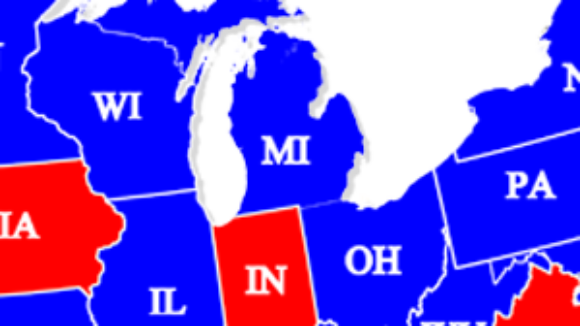
Shikha Dalmia of Reason looks at big labor's effort keep Michigan a second rate economic state through a series of referendums on the statewide ballot next month: We've seen Gov. Scott Walker's battle in Wisconsin and the Chicago Teachers Union strike next door. Now in Michigan comes another Midwestern political showdown that will carry enormous implications for the role of unions in American life. [media-credit name=" " align="alignright" width="300"][/media-credit]The Michigan Supreme Court recently approved the placement of a proposed constitutional amendment on the November ballot. If passed by voters, the so-called Protect Our Jobs amendment would give public-employee unions a potent new tool to challenge any laws—past, present or future—that limit their benefits or collective-bargaining powers. It would also bar Michigan from becoming a right-to-work state in which mandatory union dues are not a condition of employment. The budget implications are dire. Michigan public unions began pushing the initiative last year, shortly after Michigan Gov. Rick Snyder—facing a $2 billion fiscal hole—capped public spending on public-employee health benefits at 80% of total costs. This spring, national labor unions joined the amendment effort after failing to prevent Indiana from becoming a right-to-work state. Bob King of the United Auto Workers said that Michigan's initiative would "send a message" to other states tempted to follow Indiana's example. The UAW, along with allies in the AFL-CIO and the Teamsters, poured $8 million into gathering 554,000 signatures—some 200,000 more than needed—to put Protect Our Jobs on the Michigan ballot.
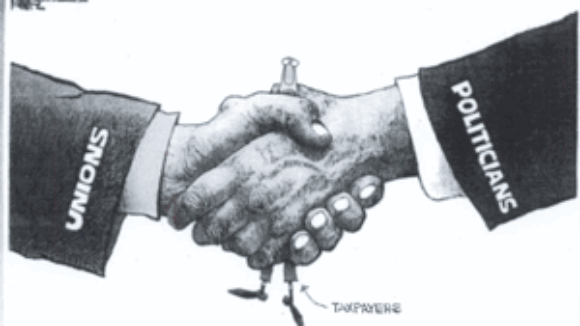
[media-credit name=" " align="aligncenter" width="300"][/media-credit]After giving away the store and the kitchen sink to the union bosses, Illinois Gov. Pat Quinn is looking for a federal taxpayer guarantee for the state's pension debt, the Wall Street Journal opines: Now that Chicago's children have returned to not learning in school, we can all move on to the next crisis in Illinois public finance: unfunded public pensions. Readers who live in the other 49 states will be pleased to learn that Governor Pat Quinn's 2012 budget proposal already floated the idea of a federal guarantee of its pension debt. Think Germany and eurobonds for Greece, Italy and Spain. Thank you for sharing, Governor. Sooner or later, we knew it would come to this since the Democrats who are running Illinois into the ground can't bring themselves to oppose union demands. Illinois now has some $8 billion in current debts outstanding and taxpayers are on the hook for more than $200 billion in unfunded retirement costs for government workers. By some estimates, the system could be the first in the nation to go broke, as early as 2018. Liabilities are also spiralling nationwide, with some $2.5 trillion in unfunded state pension costs. According to a paper released Thursday by the Illinois Policy Institute, the crisis will end up pitting states against each other as taxpayers in places like Tennessee, Texas, Virginia and Utah will be asked to subsidize the undisciplined likes of Illinois and California.
Union activists have collected enough signatures to force a statewide vote on the unionization of home health care workers — a scheme that ended earlier this year when the legislature and governor said no more. This effort will force unionization…
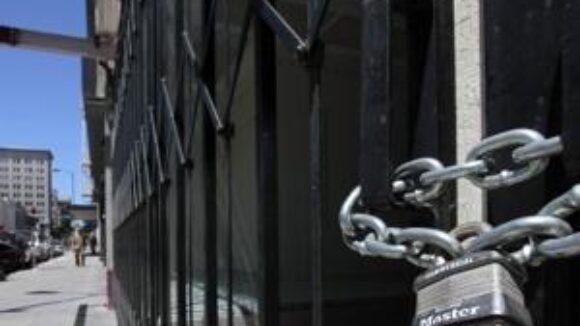
It’s a common refrain — As California goes, so goes the nation. Unfortunately, in the case of cities like Stockton, it may be true. …
Forbes Magazine examines the impact of the National Right to Work Foundation’s latest Supreme Court’s victory in Knox vs. SEIU: The Supreme Court today rejected, on First Amendment grounds, the idea that government-employee unions can charge non-members…
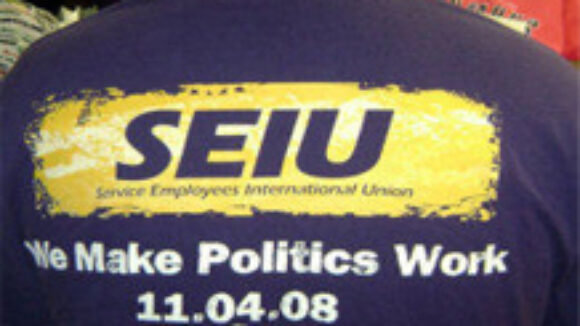
It’s hard to believe that the Democratic National Convention will go off without a snag. The selection of North Carolina — a Right to Work state — did not go over…